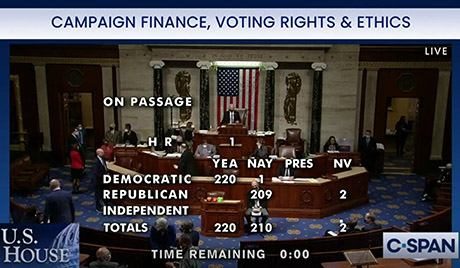Analysis by WorldTribune Staff, March 22, 2021
Government watchdog group Judicial Watch has won several major victories in the past few years, forcing states to clean up their voter rolls by removing inactive voters.
But Judicial Watch’s winning streak may be derailed by H.R. 1, the Democrats’ so-called “For the People Act” voting reform legislation which critics say will nationalize elections and make the federal election bureaucracy less open and more secret.

“Voter rolls may become something akin to historical records,” said Robert Popper, a former Justice Department attorney who leads Judicial Watch’s voter integrity effort. “You may have inactive voters on the rolls for 20, 30 years.”
H.R. 1 passed the House on March 3 without a single Republican vote. If approved by the Senate and signed by Joe Biden, the law would take many election functions away from states and hand them to the D.C. Swamp, critics say.
“Protecting swollen voting lists is just one of a number of H.R. 1 measures to blunt any watchdog, be it a nonprofit like Judicial Watch or citizens, from challenging a voter’s soundness,” Rowan Scarborough noted in a March 17 analysis for The Washington Times. “Conservatives believe the Democrats’ target is them since they do most of the integrity oversight, state by state.”
H.R. 1 calls for a new select “class of users” who are exclusively authorized to inspect voter rolls. Judicial Watch officials wonder if blue states such as California, where it has been active, will cut them off.
In California, Judicial Watch forced Los Angeles County to follow the 1993 National Voter Registration Act which mandates cleaning up rolls sometimes cluttered with more people than the jurisdiction’s total number of eligible voters.
In Section 2502 of H.R. 1, failure to respond to an address confirmation postcard from an elections board could no longer be used to start the clock on removing an inactive voter. Instead, the notice has to be returned, undeliverable. Even if the registrant never votes, there is no removal.
“I think it will crush anyone’s ability to sue,” Popper told The Washington Times. “These are people who need to be removed. It’s always a minority of people who write back and say, ‘No, no, I still live here.’ ”
A Judicial Watch lawsuit filed in Pennsylvania in April 2020 forced the state to drop 800,000 inactive voters. That lawsuit probably could not be brought under H.R. 1. “We would need more than we had,” said Popper.
Judicial Watch has been able to sue based on states not following the National Voter Registration Act requirement to mail address confirmation notices. Under H.R. 1, the watchdog must show that the listed people are no longer living there.
H.R. 1 would mandate that all challenges be sent to the U.S. District Court in Washington. No other federal district court would be able to hear challenges. The D.C. court now has 11 active judges appointed by Democrat presidents and four by former President Donald Trump.
What’s more, the assigned judge has the power to limit all challengers to one attorney, said Hans von Spakovsky, legal scholar and elections expert at the Heritage Foundation.
“It is not only a denial and restriction of fundamental due process rights, but severely limits the ability of challengers to obtain full and robust legal representation,” von Spakovsky told The Washington Times.
From U.S. District Court, all appeals must go to the U.S. Court of Appeals for D.C., also a Democrat-heavy judiciary. Von Spakovsky provided some history. Democrats added three seats during the Obama administration despite a light case load.
“This was a blatant attempt to pack the appeals court with liberal justices who would vote the way liberals want them to vote on bills like H.R. 1 and may explain why they are routing lawsuits against H.R. 1 to the District of Columbia,” he said.
Intelligence Brief __________ Replace The Media
